April 10, 2013
by Robin Parker -
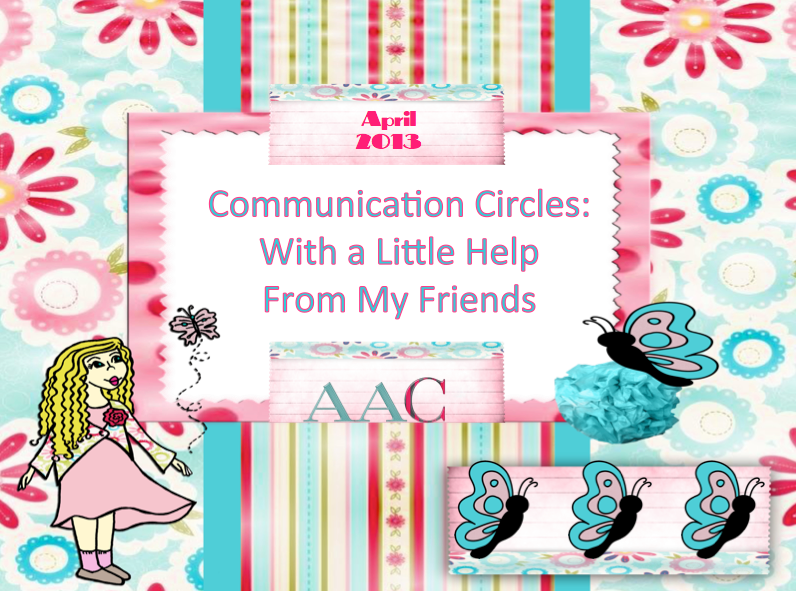
On-line education has been a huge part of our professional development. With shrinking travel budgets and various time constraints, we love to make use of a variety of on-line learning formats. We recently were lucky enough to come across myInfinitec. Infinitec stands for infinite potential through technology. Infinitec’s goal is to advance independence and promote inclusive opportunities for children and adults through technology. Through myinfinitec, We found a free webinar that we just had to attend. That webinar was: Communication Circles: With A Little Help From My Friends by Dr. Caroline Musselwhite. A huge thanks to Jennifer T. Skalitzky from myinfinitec for facilitating the webinar and the information in this post. Dr. Musselwhite has generously taken the time and effort to summarize the key features of Communication Circles and to make the handouts available. So if you have interest in helping AAC users to communicate naturally, in a variety of... [Read More...]
February 7, 2013
by Carole Zangari -
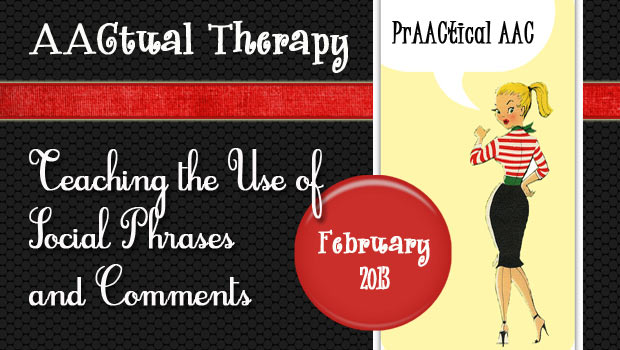
We are so happy to have Deanna Wagner back with more AACtual Therapy. In her previous post, Deanna talked about her work with AAC groups for adults. Today, she shares a lesson plan and some implementation ideas. As a veteran AAC interventionist, Deanna’s therapy plan has many wonderful features that undoubtedly contribute to the success her students experience. Lesson/therapy Session: Using Social Phrases/Comments Intended audience & type of AAC: All devices/AAC users should have access to social commenting. Our Class: Middle school, self-contained classroom. Group of 3 students, SLP leading activity, paraprofessional, and Teacher of Visually Impaired supporting Goal for Overall Lesson: Use word/icon combinations to express opinions or make social comments Specific Student Goals: Student #1 will combine 2 icons for social interjections – please, thank you, cool, awesome, yum, yuk, ok (ECO2 from PRC) Student #2 will functionally use new phrases to chat or indicate an opinion (Dynavox... [Read More...]
January 24, 2013
by Carole Zangari -
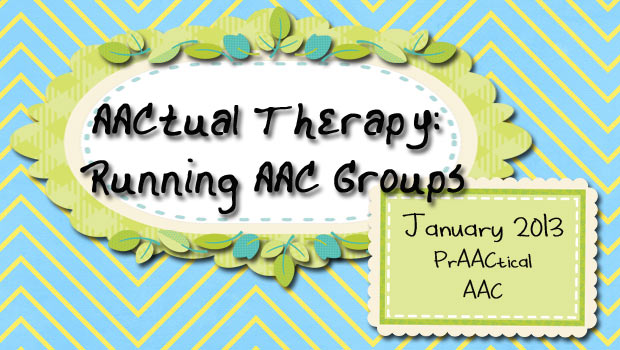
We are just delighted to share the AACtual Therapy of Arizona-based SLP, Deanna Wagner. We’ve known Deanna by reputation for a long while, but got to meet her in person at ISAAC this past summer. She has been involved in the AAC world for over 20 years. Her story as an AAC clinician is an interesting one: “I was lucky enough to attend one of the first university AAC courses, at the University of Wisconsin-Whitewater. My instructor was Dr. Mary Blake Huer, who was a recent president of USSAAC. Because we did not have enough courses in the communication disorders program, I also studied in the special education department and received a graduate degree in severe/profound handicaps. My first job was as AAC evaluator and trainer at Curative Rehabilitation in Wisconsin. I was lucky enough to meet a number of the inspirational team members who made up the model programs for... [Read More...]
September 28, 2012
by Carole Zangari -
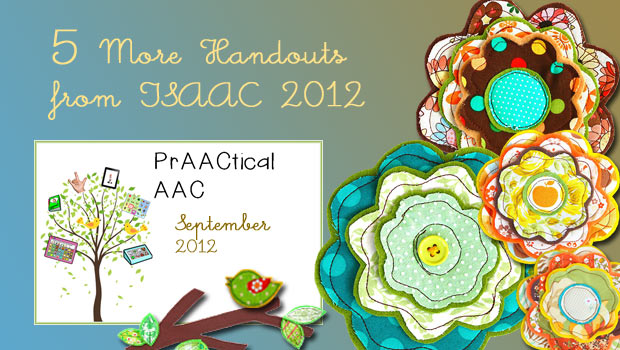
In past posts, we shared links to some handouts from the ISAAC 2012 Biennial Conference in Pittsburgh. While it is great for those of us who attended but couldn’t get to every presenter we wanted to hear, the main idea was to help spread the awesome content to those of you who couldn’t be there. Here are some others that may be of interest. Creating a Core Vocabulary for a Common Core Curriculum by Karen Erickson, Penelope Hatch, Allison Dennis, & Marlene Cummings Baby Talk/Kid Talk PWUAAC Talk to Little Ones! by Krista Howard, Kaitlyn Graham, & Caroline Musselwhite Evaluating Preferred Augmentative and Alternative Communication Strategies for Patients in Long Term Health Care Hospitals by Susan Fager, Jenna LeDoux, & David Beukelman Prompting: A Cautionary Tale of Use, Misuse & Abuse by Jane Korsten & Terry Foss Supporting Linguistic Skills Through iDevices: Cool Tricks with New Applications by Caroline Musselwhite,... [Read More...]
July 7, 2012
by Carole Zangari -
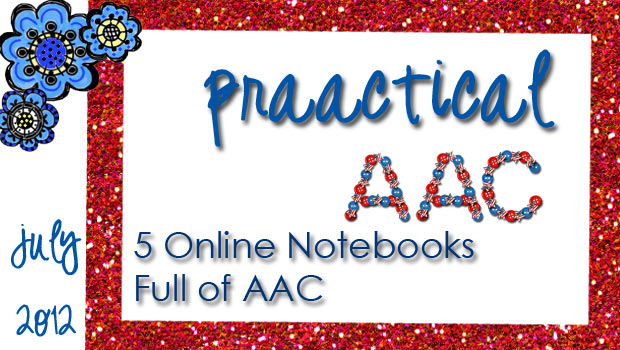
I have a real love-hate relationship with LiveBinders. The impatient part of me struggles with its quirky interface, but I keep coming back because of the wealth of resources and helpful site administrators. Here are some of the AAC-related binders we use most often. – General AAC Resources by Janice Reese AAC & Music by Deanna Wagner Social Scripts for People who use AAC by Caroline Musselwhite Our binder on Building Communication Opportunities for People who use AAC Our binder on Choice Boards –
April 25, 2012
by Carole Zangari -
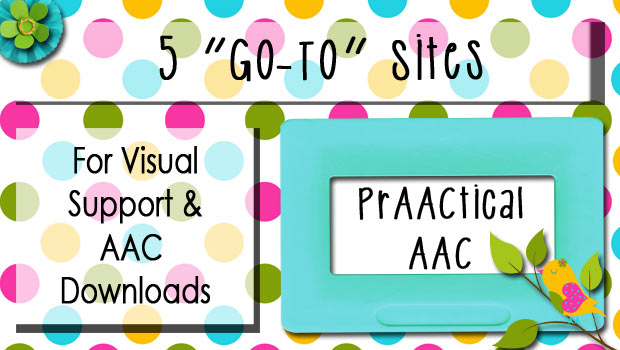
We’ve shared a number of resources for downloadable AAC materials in previous posts like this and on some of our Pinterest boards. Sometimes we start from scratch but other times we check out what other professionals and families have created, then download and adapt them for our use. It’s wonderful to see the generous online community growing! Here are some more sites we like for AAC and visual support downloads. – 1. For Visual Supports from Hamilton Boone Madison Special Services Cooperative 2. From Special Education Technology-British Columbia: PictureSet 3. Free software with symbols for making visual supports: QuickPics Symbols from Patrick Ecker 4. Behavioral supports from eLearning Visuals 5. Wonderful activities to support language and literacy from Dr. Caroline Musselwhite – Where do you go for online materials to download materials for your AAC work?
January 9, 2023
by Carole Zangari -
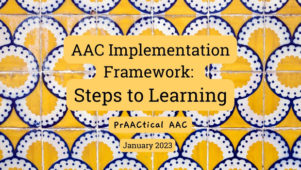
We’re so pleased to welcome PrAACtical AAC contributor Vicki Clarke back to these pages. While you may remember Vicki from her outstanding AAC Assessment Corner posts, her most recent efforts focus on strengthening our AAC practices. Throughout the series, Vicki draws on her experiences supporting AAC users and teams in clinical and school settings and shares prAACtical information that we can all learn from Introduction to AAC 101 Steps to Learning It is no small task to consider how we will help our students progress from communicating only through behaviors to communicating any message they desire independently and spontaneously. In fact, in 1997, Gloria Soto conducted survey research that tells us: Teachers have always believed that communication training for students is positive, and Communication training is a collaborative effort between teachers and SLPs, Despite these beliefs, there is still a prevalent hesitancy to begin to explicitly instruct students in AAC.... [Read More...]






